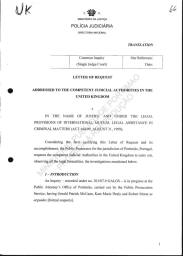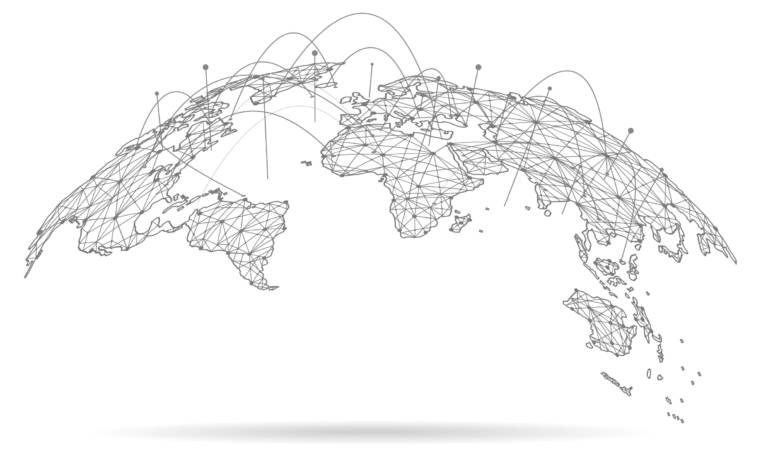Recognizing the Value of Letters Rogatory in International Law
Recognizing the Value of Letters Rogatory in International Law
Blog Article
Letters Rogatory Explained: Facilitating Legal Cooperation Between Countries

Interpretation of Letters Rogatory
Letters rogatory are formal requests made by a court in one jurisdiction to a court in one more territory, looking for support in obtaining evidence or testimony for a legal action. This procedural mechanism is vital in the context of worldwide law, where legal systems might differ, and cross-border cooperation is needed. Letters rogatory help with the event of details that may be essential for adjudicating instances, particularly in instances including complicated transnational concerns.
Normally, these demands occur in civil, criminal, or management matters where an event calls for evidence that is located outside the jurisdiction of the requesting court. The letters work as a way to ensure that the concepts of due process are upheld, making it possible for courts to gain access to proof that could otherwise stay hard to reach because of geographic or lawful barriers.
Using letters rogatory is controlled by international treaties, bilateral agreements, or domestic regulations, which delineate the procedures and responsibilities of the courts entailed. It is necessary to keep in mind that the execution of such demands is not ensured; they depend on the legislations and techniques of the territory obtaining the letter. Hence, letters rogatory are a crucial tool for promoting legal collaboration and guaranteeing justice throughout boundaries.
The Process of Issuing Letters Rogatory
Issuing letters rogatory entails an organized procedure that makes certain compliance with both domestic and global legal standards. The requesting party, normally a court or lawful authority, prepares a formal demand describing the nature of the support sought, the proof or info needed, and the lawful basis for the demand. This document should be exact to facilitate understanding by the foreign jurisdiction.

The following step involves transferring the letters rogatory to the designated foreign authority. This is typically done through polite channels or worldwide lawful assistance frameworks, guaranteeing that the demand is obtained and recognized by the foreign court. The foreign court then refines the demand according to its own legal treatments, inevitably replying to the asking for event with the in-demand info or evidence, therefore promoting worldwide lawful teamwork.
Significance in International Legislation
The value of letters rogatory in international regulation can not be overstated, as they act as a critical mechanism for judicial participation throughout borders. These formal ask for assistance in legal matters permit courts in one territory to inquire, proof, or the visibility of witnesses from one more jurisdiction, consequently promoting the management of justice in global instances.
Letters rogatory are particularly essential in the context of globalization, where legal disagreements often span numerous countries. They allow the collection of proof that may otherwise be inaccessible, guaranteeing that lawful procedures are notified and fair. By promoting partnership between judicial systems, letters rogatory assistance copyright the guideline of law and advertise mutual regard among nations.
Moreover, the use of letters rogatory demonstrates a dedication to global standards and principles of collaboration, mirroring the interconnected nature of modern-day legal practices. It shows the significance of sticking to well-known procedures and treaties, such as the Hague Convention, which provides a framework for these requests - Letters rogatory. Inevitably, letters rogatory boost the efficacy of lawful processes, making sure that justice is not prevented by geographical borders
Obstacles and Limitations
In spite of their significance, letters rogatory face numerous challenges and restrictions that can restrain their performance. One main issue is the differing lawful structures and procedures across territories, which can bring about misunderstandings and hold-ups in the execution of demands. Various countries might have unique needs for the validity of letters rogatory, making complex the procedure better.
Furthermore, the usually drawn-out nature of worldwide legal participation can prevent timely access to proof or witnesses. This delay may detrimentally influence recurring examinations or legal procedures, specifically in instances needing urgent action. In addition, the lack of sources and training in some territories can result in inadequate handling of requests, causing insufficient original site or incomplete actions.
Cultural differences and differing attitudes in the direction of legal processes can also pose significant barriers. For circumstances, countries with less formal legal systems might struggle to conform with the procedural roughness anticipated in letters rogatory. Political tensions between countries can influence the willingness to execute demands, resulting in an absence of cooperation and lessening the utility of this system in international legislation. These obstacles demand constant discussion and reform to enhance the effectiveness of letters rogatory in legal collaboration.
Instance Studies and Instances

Conversely, difficulties can emerge, as seen in an instance including a European country looking for proof in an ongoing criminal matter from a non-EU nation - Letters rogatory. The procedure was postponed due to governmental difficulties and varying legal requirements, inevitably preventing the examination
These instances show that while letters rogatory can promote international collaboration and accelerate legal procedures, they additionally highlight the need for clear interaction and understanding of legal structures in between countries. Such study emphasize the relevance of refining this device to enhance performance and effectiveness in global legal matters.
Conclusion
In summary, letters rogatory serve as a vital device for assisting in legal collaboration in between nations, ensuring the collection of evidence and testament across territories. Their relevance in global law can not be overemphasized, as they promote due process and improve the efficiency of cross-border lawful proceedings.
Letters rogatory are formal demands made by a court in one jurisdiction to a court in one more territory, looking for help in obtaining evidence or testimony for a lawful proceeding. visit here The asking for party, generally a court or lawful authority, prepares a formal demand describing the nature of the aid sought, the evidence or details required, and the lawful basis for the demand. The international court then processes the request according to its own lawful treatments, inevitably reacting to the asking for event with the desired details or proof, hence assisting in global legal cooperation.
Moreover, the usage of letters rogatory shows a dedication to international standards and principles of participation, showing the interconnected nature of contemporary lawful techniques.Worldwide lawful cooperation with letters rogatory is not without its real-world implications, as highlighted by different instance research studies that highlight both successes and challenges.
Report this page